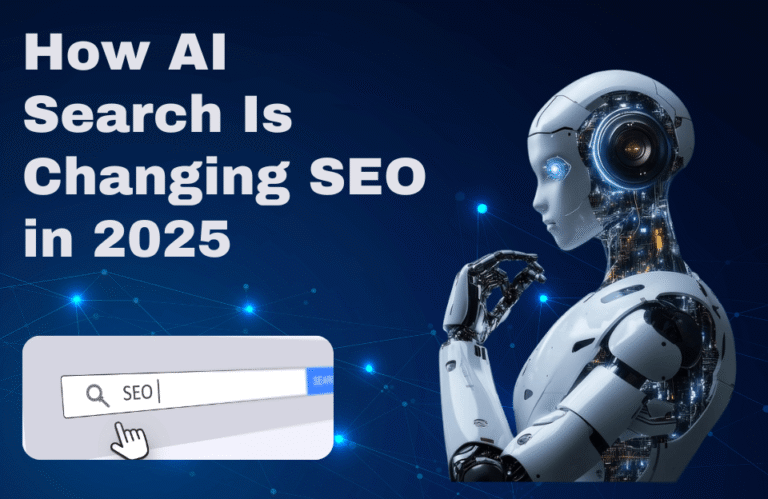The search landscape is evolving faster than ever. In 2025, AI-powered search has become the defining force behind how users discover, interact with, and trust online information. Traditional SEO strategies-once centered on keywords and backlinks-are no longer enough. Search engines are leveraging artificial intelligence, machine learning, and generative AI to deliver contextual, conversational, and hyper-personalized results.
For businesses, digital marketers, and brands, this shift is both a challenge and an opportunity. Understanding the mechanics of AI search is the first step; knowing how to adapt is what determines long-term success.
At Next Insight Technologies, we specialize in helping brands stay ahead of digital transformation, and in this article, we’ll explore how AI search is changing SEO in 2025 and share practical steps you can take to adapt.
Understanding AI-Powered Search in 2025
AI-driven search isn’t just about ranking websites anymore-it’s about understanding intent and providing solutions instantly. Let’s break down the core elements:
- Generative AI Results: Search engines like Google, Bing, and Perplexity are embedding AI-generated answers directly at the top of search results, reducing clicks to traditional websites.
- Voice and Conversational Search: With AI assistants integrated into mobile devices and smart homes, users increasingly search in natural language.
- Contextual Relevance: AI now considers browsing history, location, and user behavior to personalize results.
- Multi modal Search: Users can combine text, voice, and even images when searching, pushing SEO beyond keywords.
In short, AI search engines don’t just retrieve information-they synthesize it. For businesses, this means the competition isn’t just other websites-it’s AI itself.
Key Ways AI Search is Impacting SEO
The shift to AI-first search engines in 2025 has reshaped SEO in the following ways:
- Decline of Click-Through Traffic: AI-generated answers often satisfy user queries without requiring a click. This phenomenon, known as zero-click searches, is forcing brands to rethink how they capture attention.
- Greater Emphasis on E-E-A-T: Google’s Experience, Expertise, Authoritativeness, and Trustworthiness (E-E-A-T) is more critical than ever. AI search favors authoritative, fact-checked, and high-quality sources.
- Shift Toward Semantic SEO: Keyword stuffing is obsolete. Instead, search engines reward topic authority, semantic relationships, and context-rich content.
- Rise of AI-Powered Snippets: Featured snippets, summaries, and AI previews are the new battleground. Winning these spots requires structured data, FAQs, and schema optimization.
- Personalization & Predictive Search: AI tailors results to the individual. Businesses must adapt by offering personalized content experiences that align with user intent.
Practical SEO Steps to Adapt in 2025
Adapting to AI-driven search requires more than just tweaking keywords. Here are actionable SEO strategies to future-proof your digital presence:
1. Optimize for Conversational Search :
- Use natural language in your content.
- Anticipate user questions and provide clear, direct answers.
- Add FAQ sections to target voice search queries.
2. Build Topic Clusters and Semantic Content :
- Develop pillar pages covering broad topics.
- Link to supporting cluster articles for in-depth insights.
- Focus on context, not just keywords, to strengthen topic authority.
3. Leverage Structured Data & Schema Markup :
- Implement schema for articles, products, and reviews.
- Structured data helps AI understand your content and improves chances of being featured in snippets.
4. Prioritize Content Depth & Trustworthiness :
- Publish long-form, expert-driven content backed by credible sources.
- Highlight author credentials to boost E-E-A-T.
- Regularly update older posts with fresh data.
5. Optimize for Zero-Click Visibility :
- Use concise answers, bullet points, and summaries.
- Format content for featured snippets, knowledge panels, and AI summaries.
6. Personalize Content Experiences :
- Implement dynamic content that adjusts to user behavior.
- Use data analytics to predict what users will want next.
7. Embrace Multi modal SEO :
- Optimize not just for text, but also for images, video, and voice.
- Use alt text, transcripts, and video optimization strategies.
8. Strengthen Technical SEO :
- Ensure fast-loading websites with Core Web Vitals optimization.
- Improve mobile responsiveness and secure browsing (HTTPS).
By implementing these practices, businesses can align with how AI interprets, curates, and ranks content in 2025.
Future Outlook: Where AI Search is Headed
Looking ahead, AI search will only become more predictive, immersive, and integrated. We can expect:
- AI-driven personalization that predicts queries before users even type.
- Deeper integration of search with AR/VR platforms, reshaping eCommerce experiences.
- Multilingual AI translation, making content universally accessible.
- A stronger focus on user experience signals like engagement, dwell time, and satisfaction.
The takeaway? SEO is no longer about outsmarting algorithms-it’s about aligning with AI’s mission to provide the best possible user experience.
Conclusion
The rise of AI-powered search in 2025 has fundamentally transformed SEO. From conversational queries and zero-click results to E-E-A-T-driven ranking factors, businesses must adapt quickly to remain visible.
The good news is that SEO isn’t dead-it’s evolving. By focusing on semantic content, structured data, trust-building, and user experience, you can future-proof your digital presence.
At Next Insight Technologies, we help businesses stay ahead of digital change with cutting-edge SEO strategies, AI-driven insights, and customized digital marketing solutions.
Ready to optimize your brand for the future of AI-driven search? Contact Next Insight Technologies today.


